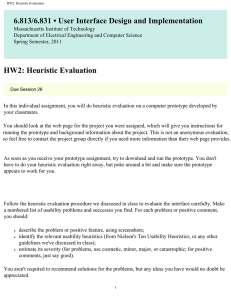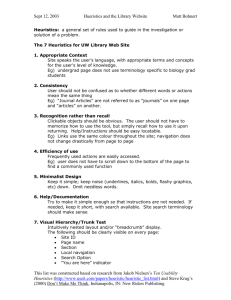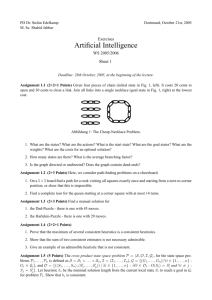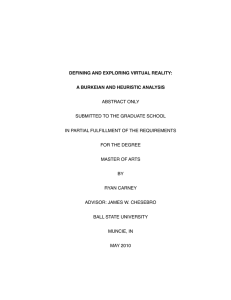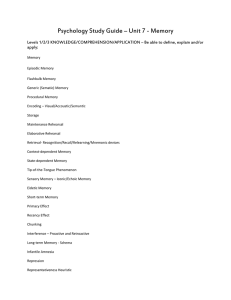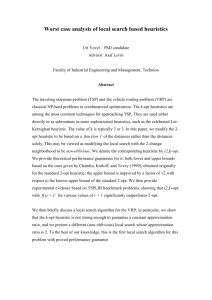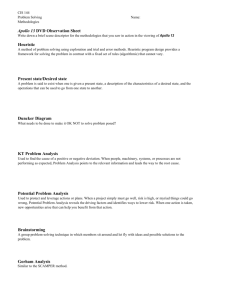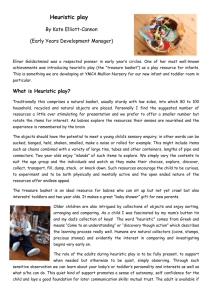Intro to Cognitive Neuroscience Decision-making and choices 1
advertisement
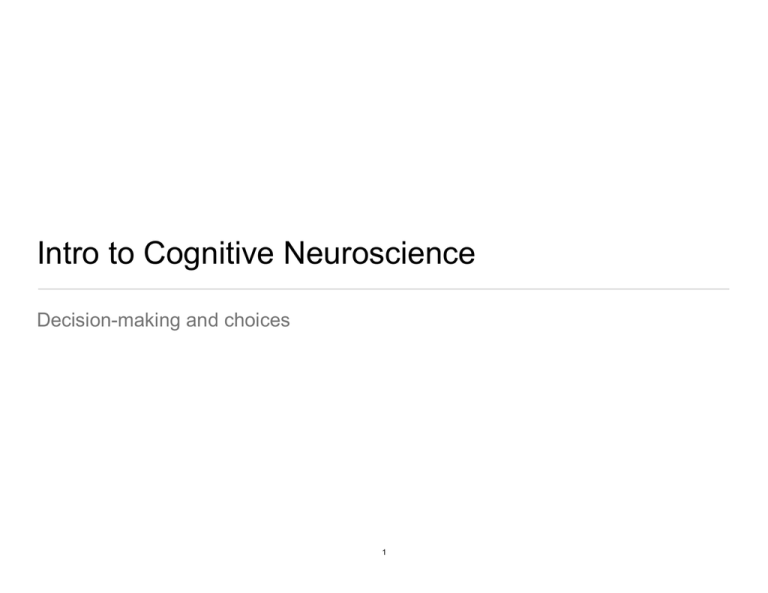
Intro to Cognitive Neuroscience Decision-making and choices 1 Rational decision making • Expected utility model depends on considering values and probabilities of outcomes. • Decision tree - what to do on a Friday evening? 2 Rational decision making - or not • Expected utility model is not great at reflecting what people actually do. • Suppose the nation is preparing for the outbreak of a disease that is expected to kill 600 people. Two alternative programs have been proposed: • Option 1: 200 people will be saved. • Option 2: there is a 1/3 probability that all 600 people will be saved, and a 2/3 probability that no one will be saved. 3 Rational decision making - or not • Expected utility model is not great at reflecting what people actually do. • Suppose the nation is preparing for the outbreak of a disease that is expected to kill 600 people. Two alternative programs have been proposed: • Option 1: 400 people will die. • Option 2: there is a 1/3 probability that no one will die, and a 2/3 probability that 600 people will die. 4 Heuristics • Heuristic - a general rule or strategy that typically produces a correct decision. • Researchers in decision-making often look at cases where people make errors to understand the limits of our heuristics. 5 Representativeness Heuristic • Suppose you toss a coin six times. Which of these outcomes is most likely? • HH H T T T • TH T H T H • HT T H T H • HH H H H H Image courtesy of MIT OpenCourseWare. 6 Representativeness Heuristic • We judge that a sample is more likely if it is similar to the population from which it was selected. • Representativeness is useful for making category judgments in most cases. • But, fails when considering more complex categories. 7 Representativeness Heuristic • A town is served by two hospitals. About 45 babies per day are born in the larger hospital, and about 15 babies per day are born in the smaller hospital. Approximately 50% of all babies are boys, but the exact number fluctuates from day to day. For a period of 1 year, both hospitals kept a record of the number of days on which more than 60% of babies were boys. Which hospital do you think reported more such days? A) Larger hospital B) Smaller hospital C)About the same (within, say, 5% of each other) Image courtesy of Sean Dreilinger. 8 Representativeness Heuristic • Sample size is a cause of one sort of errors representativeness leads to. • Small-sample fallacy. 9 Availability heuristic • Read the following list of names: • Louisa May Alcott • John Dickinson Carr • Alice Walker • Thomas McGuane • Laura Ingalls Wilder • Frederick Rolfe • Edward George Lynton 10 Availability heuristic • Notice anything about them? 11 Availability heuristic • Notice anything about them? • Were there more women’s names or men’s names listed? 12 Availability heuristic • We judge frequency by assessing how easily relevant examples can be retrieved from memory. • Accurate as long as frequency correlates with availability. • Recency and familiarity affect availability. 13 Anchoring and adjustment heuristic • We make a first approximation and then make adjustments to that number based on new information. • But, we usually assign too much weight to the anchor, and make adjustments that are too small. 14 Anchoring and adjustment heuristic • Tversky and Kahneman (1974) asked people to estimate various percentages (e.g. what percentage of UN delegates are from African nations?). • Before requesting a reply, experimenter spun a wheel with numbers from 0 100, then asked participants to indicate their answer by moving the wheel up or down from where it stopped. 15 So... what’s the big picture? • Decisions are influenced by lots of things we’re not directly aware of. • When people are made aware of the flaws in their heuristics, they make better/more accurate decisions. 16 Decision making, the brain, and free will • Soon et al, 2008. Unconscious determinants of free decisions in the human brain. • Interested in: decision making and the brain. • Study this using: fMRI and a button-press decision. 17 Decision making, the brain, and free will • Participants watched a set of letters being presented, and decided to press either the left or right button. 18 Decision making, the brain, and free will • Some of the big questions... • If we believe that subjective experiences (like decision making) are derived only from physical phenomena in the brain, then what? • Physical phenomena (says physics) are only ever caused by other physical phenomena and, with sufficient information, are always predictable. • What does that mean for our decision to do anything? 19 MIT OpenCourseWare http://ocw.mit.edu Introduction to Cognitive Neuroscience Summer 2008 For information about citing these materials or our Terms of Use, visit: http://ocw.mit.edu/terms.
